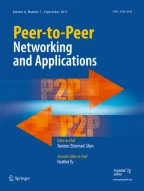Abstract
Many reputation systems have been proposed to distinguish malicious peers and to ensure the quality of the service in P2P file sharing systems. Most of those reputation systems implicitly assumed that normal peers are always altruistic and provide their resources unconditionally when requested. However, as independent decision makers in real networks, peers can be completely altruistic (always cooperative, ALLC), purely selfish (always defective, ALLD), or reciprocal (R). In addition, those systems do not provide an effective method to reduce free-riders in P2P networks. To address these two problems, in this paper, we propose an EigenTrust evolutionary game model based on the renowned EigenTrust reputation model. In our model, we use evolutionary game theory to model strategic peers and their transaction behaviors, which is close to the realistic scenario. Many experiments have been designed and performed to study the evolution of strategies and the emergence of cooperation under our proposed EigenTrust evolutionary model. The simulation results showed that rational users are inclined to cooperate (enthusiastically provide resources to other peers) even under some conditions in which malicious peers try to destroy the system.
Similar content being viewed by others
References
Napster. http://www.napster.com/
Gnutella. http://gnutella.wego.com/
KaZaA. http://www.kazaa.com/
BitTorrent. http://www.bittorrent.com/
Douceur JR (2002) The sybil attack. In: Peer-to-peer Systems. Springer, pp 251–260
Ciccarelli G, Cigno RL (2011) Collusion in peer-to-peer systems. Comput Netw 55(15):3517–3532
Kamvar SD, Schlosser MT, Garcia-Molina H The eigentrust algorithm for reputation management in p2p networks. In: Proceedings of the 12th international conference on World Wide Web 2003. ACM, pp 640–651
Feldman M, Papadimitriou C, Chuang J, Stoica I (2006) Free-riding and whitewashing in peer-to-peer systems. IEEE J Sel Areas Commun 24(5):1010–1019
Thommes R, Coates M Modeling virus propagation in peer-to-peer networks. In: 2005 Fifth International Conference on Information, Communications and Signal Processing 2005, IEEE, pp 981–985
Resnick P, Kuwabara K, Zeckhauser R, Friedman E (2000) Reputation systems. Commun ACM 43(12):45–48
Jsang A, Ismail R The beta reputation system. In: Proceedings of the 15th bled electronic commerce conference 2002, pp 2502–2511
Resnick P, Zeckhauser R (2002) Trust among strangers in internet transactions: empirical analysis of ebay’s reputation system. The Economics of the Internet and E-commerce 11(2):23–25
Adar E, Huberman BA (2000) Free riding on Gnutella. First Monday 5(10)
eBay. http://www.ebay.com
ePinions. http://www.epinions.com
Xiong L, Liu L (2004) Peertrust: supporting reputation-based trust for peer-to-peer electronic communities. IEEE Trans Knowl Data Eng 16(7):843–857
Zhou R, Hwang K (2007) Powertrust: a robust and scalable reputation system for trusted peer-to-peer computing. IEEE Trans Parallel Distrib Syst 18(4):460–473
Cui G, Li M, Wang Z, Ren J, Jiao D, Ma J (2014) Analysis and evaluation of incentive mechanisms in P2P networks: a spatial evolutionary game theory perspective. Concurrency and Computation: Practice and Experience
Ma RT, Lee S, Lui J, Yau DK (2006) Incentive and service differentiation in P2P networks: a game theoretic approach. IEEE/ACM Trans Networking (TON) 14(5):978–991
Gupta R, Somani AK (2005) Game theory as a tool to strategize as well as predict peers’ behavior in peer-to-peer networks. In: 11th International Conference on Parallel and Distributed Systems, 2005. Proceedings. IEEE, pp 244–249
Mortazavi B, Kesidis G (2006) Cumulative reputation systems for peer-to-peer content distribution. In: 2006 40th Annual Conference on Information Sciences and Systems. IEEE, pp 1546–1552
Buragohain C, Agrawal D, Suri S (2003) A game theoretic framework for incentives in P2P systems. arXiv:cs/0310039
Mejia M, Pea N, Muoz JL, Esparza O, Alzate MA (2011) A game theoretic trust model for on-line distributed evolution of cooperation inMANETs. J Netw Comput Appl 34(1):39–51
Nowak MA, Sigmund K (1998) Evolution of indirect reciprocity by image scoring. Nature 393(6685):573–577
Zuo F, Zhang W (2014) An Evolutionary Game-Based Mechanism for Routing P2P Network Flow among Selfish Peers. Journal of Networks 9(1):10–17
Li Y-M, Tan Y, De P (2013) Self-organized formation and evolution of peer-to-peer networks. INFORMS Journal on Computing 25(3):502–516
Christoforou E, Anta AF, Georgiou C, Mosteiro MA, Snchez A (2013) Applying the dynamics of evolution to achieve reliability in masterworker computing. Concurrency and Computation: Practice and Experience 25(17):2363–2380
Traulsen A, Nowak MA, Pacheco JM (2006) Stochastic dynamics of invasion and fixation. Phys Rev E 74(1):011909
Wang Z, Szolnoki A, Perc M (2012) Evolution of public cooperation on interdependent networks: The impact of biased utility functions. EPL (Europhysics Letters) 97(4):48001
Altrock PM, Traulsen A (2009) Deterministic evolutionary game dynamics in finite populations. Phys Rev E 80(1):011909
Gmez-Gardees J, Romance M, Criado R, Vilone D, Snchez A (2011) Evolutionary games defined at the network mesoscale: the public goods game. Chaos: An Interdisciplinary Journal of Nonlinear Science 21(1):016113
Chen R, Zhao X, Tang L, Hu J, Chen Z (2007) CuboidTrust: a global reputation-based trust model in peer-to-peer networks. In: Autonomic and Trusted Computing. Springer, pp 203–215
Chiluka N, Andrade N, Gkorou D, Pouwelse J Personalizing eigentrust in the face of communities and centrality attack. In: 2012 IEEE 26th International Conference on Advanced Information Networking and Applications (AINA) 2012. IEEE, pp 503–510
Acknowledgments
This work is supported by Nature Science Foundation of China (61272173, 61403059, 61572095).
Author information
Authors and Affiliations
Corresponding author
Rights and permissions
About this article
Cite this article
Lu, K., Wang, J. & Li, M. An Eigentrust dynamic evolutionary model in P2P file-sharing systems. Peer-to-Peer Netw. Appl. 9, 599–612 (2016). https://doi.org/10.1007/s12083-015-0416-1
Received:
Accepted:
Published:
Issue Date:
DOI: https://doi.org/10.1007/s12083-015-0416-1
